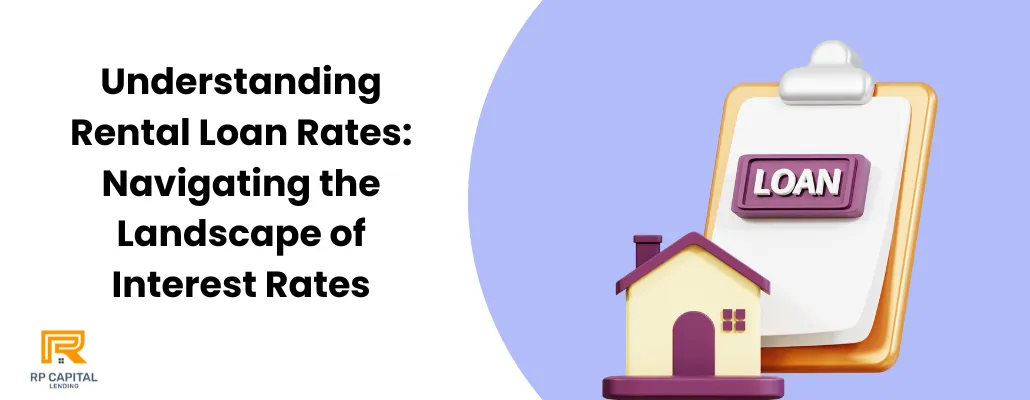
CALL ANYTIME
Blog

Understanding Rental Loan Rates: Navigating the Landscape of Interest Rates
In the world of real estate investment, securing a rental property can be a significant step towards financial independence. However, the journey to acquiring a rental property often begins with understanding and navigating the complex landscape of rental loan rates.
Interest rates on these loans can profoundly affect your investment's profitability, making it essential to grasp what influences them and how you can work these factors to your advantage.
The Intricacies of Rental Loan Rates: Factors That Impact Your Investment
The Influence of the Economy
The broader economic environment plays a pivotal role in determining interest rates. Central banks adjust rates to manage economic growth and inflation. When the economy is booming, rates may increase to prevent overheating. Conversely, in a downturn, rates might drop to stimulate borrowing and investment.
Credit Score: The Borrower's Financial Passport
Your credit score is a critical factor lenders use to gauge your loan eligibility and the interest rate you'll receive. A higher credit score indicates reliability, potentially securing you a lower rate, while a lower score might lead to higher interest rates.
Loan-to-Value Ratio (LTV)
The LTV ratio measures the loan amount against the property's value. A lower LTV ratio often results in a lower interest rate as it indicates that the borrower has more equity in the property, reducing the lender's risk.
Property Type and Location
The type and location of your rental property can influence loan rates. Properties deemed as higher risk, such as those in areas prone to natural disasters or in less desirable neighborhoods, might carry higher interest rates.
The Length of the Loan Term
Shorter loan terms typically have lower interest rates compared to longer terms. While monthly payments may be higher with a shorter term, the overall interest paid over the life of the loan could be less.
Simplifying the Complex: Your Guide to Better Rental Loan Rates
Boost Your Credit Score: Pay off existing debt and keep credit card balances low. Regularly check your credit report for errors and have them corrected.
Consider a Larger Down Payment: Increasing your down payment can lower your LTV ratio, potentially securing a better interest rate.
Choose Your Property Wisely: Research locations and property types that are considered less risky to lenders to obtain more favorable rates.
Shop Around for Lenders: Don’t settle for the first offer. Explore various lenders to find the best rate and terms that suit your investment strategy.
Negotiate Terms: Be prepared to negotiate your loan terms. Even a slight reduction in the interest rate can save you a significant amount over the life of the loan.
FAQs: Navigating the World of Rental Loan Rates
Q1: How much does a good credit score affect my rental loan interest rate?
A good credit score can significantly lower your interest rate. It demonstrates to lenders that you're a low-risk borrower, potentially saving you thousands over the life of your loan.
Q2: Can I negotiate my rental loan rate with lenders?
Yes, loan rates and terms are negotiable. It's beneficial to shop around, compare offers, and negotiate to get the best possible rate.
Q3: How does the economic environment affect rental loan rates?
Economic factors such as inflation, economic growth, and central bank policies can influence interest rates. Generally, a stronger economy leads to higher rates, while a weaker economy prompts lower rates.
Q4: Is it better to choose a longer loan term for a lower monthly payment?
While longer loan terms offer lower monthly payments, they usually come with higher interest rates. It's essential to consider your long-term financial goals and investment strategy.
Q5: Does the type of rental property I choose affect the loan rate?
Yes, lenders consider the property type and location as factors in determining risk and, consequently, your interest rate. Properties in areas with high demand and low risk typically secure better rates.
Conclusion
Navigating rental loan rates requires a careful balance of understanding the market, managing your finances, and choosing the right property.
By considering the factors outlined above and armed with the knowledge to ask the right questions, investors can secure favorable loan rates, making their journey into real estate investment both profitable and fulfilling.
Keep this guide in hand as you embark on your investment venture, and let the secrets to mastering rental loan rates illuminate your path to success.
Disclaimer: Loans only apply to non-owner occupied properties. Rates, terms and conditions offered only to qualified borrowers, may vary upon loan product, deal structure, other applicable considerations, and are subject to change at any time without notice.
Copyright © 2025. All Rights Reserved.

